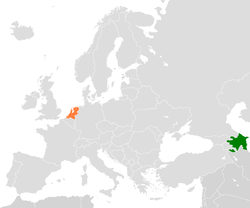| Date | Visits |
|---|
| 7 May 2009 | President of Azerbaijan Ilham Aliyev met Prime Minister of the Netherlands Jan Peter Balkenende in the framework of Prague Eastern Partnership Summit |
| 1 December 2010 | President of Azerbaijan Ilham Aliyev met Prime Minister of the Netherlands Mark Rutte at OSCE Summit in Astana |
| 23 January 2014 | President of Azerbaijan Ilham Aliyev met Prime Minister of the Netherlands Mark Rutte at Davos Economic Forum |
| 23–25 March 2014 | President of Azerbaijan Ilham Aliyev's visit to the Netherlands to participate in the Third Nuclear Security Summit held in the Hague |
| 4–6 February 2002 | Minister of Justice of Azerbaijan Fazil Mammadov visited the Netherlands |
| 12–19 May 2002 | Minister of Education of Azerbaijan Misir Mardanov visited the Netherlands |
| 4–10 December 2007 | Minister of Health of Azerbaijan Ogtay Shiraliyev to the Netherlands |
| 6–8 December 2007 | Visit of the Minister of Education of Azerbaijan Misir Mardanov to the Netherlands |
| 29 June - 2 July 2009 | Visit of the Chief of State Border Service of Azerbaijan Elchin Guliyev to the Netherlands |
| 25–28 October 2009 | Visit of the Chairman of State Migration Service of Azerbaijan Arzu Rahimov to the Netherlands |
| 8–12 August 2010 | Visit of Minister of Justice of the Netherlands Ernst Hirsch Ballin to Azerbaijan |
| 17–19 May 2011 | Minister of Emergency Situations of Azerbaijan Kamaladdin Heydarov visited to the Netherlands |
| 6–7 March 2012 | Visit of the Minister of Infrastructure and Environment of the Netherlands Melanie Henriëtte Schultz van Haegen-Maas Geesteranus to Azerbaijan |
| 10–12 June 2012 | Minister of Foreign Affairs of Azerbaijan Elmar Mammadyarov visited to the Netherlands |
| 12–14 September 2012 | Visit of Deputy Prime Minister, Minister of Economic Affairs, Agriculture and Innovation Maxime Jacques Marcel Verhagen to Azerbaijan |
| 4 February 2014 | Minister of Foreign Affairs of the Netherlands Frans Timmermans visited Azerbaijan |
| 2–5 April 2014 | Executive Director of State Oil Fond of Azerbaijan Shamhar Movsumov visited the Netherlands |
| 22–25 April 2014 | Chairman of State Migration Service of Azerbaijan Firuddin Nabiyev visited the Netherlands |
| 12–14 May 2014 | General Director of Repatriation and Departure Service of the Netherlands Rodia Maas visited Azerbaijan |
| 4 September 2014 | Minister of Foreign Affairs of Azerbaijan Elmar Mammadyarov met his Dutch colleague Frans Timmermans within the framework of the NATO Wales Summit |
| 10–11 October 2014 | General Director of Migration and Naturalization Service Rob van Lint visited Azerbaijan |
| 6–7 November 2014 | Minister of Infrastructure and Environment of the Netherlands Melanie Henriëtte Schultz van Haegen-Maas Geesteranus visited Azerbaijan |
| 15–17 April 2015 | Minister of Communication and High Technologies of Azerbaijan Ali Abbasov visited the Netherlands within the framework of the Global Conference of CyberSpace 2015 held in the Hague |
| 21–23 April 2015 | Minister of Emergency Situations of Azerbaijan Kamaladdin Heydarov visited the Netherlands |
| 22–23 April 2015 | Meeting of Minister of Foreign Affairs Elmar Mammadyarov with his Dutch colleague Bert Koenders in the framework of UN General Assembly |




